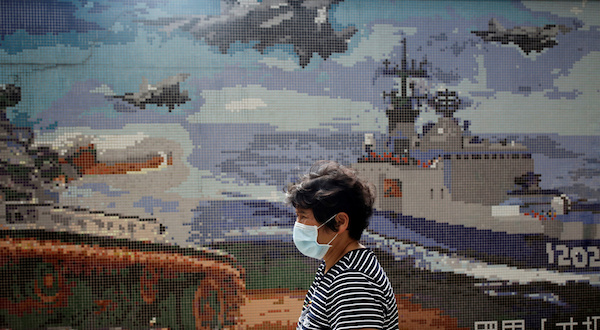
A woman, wearing a protective face mask, walks past a military recruitment poster, in Taipei, Taiwan, on April 20, 2020. (Photo by Reuters)
The World Health Organization (WHO)’s chief has "no mandate" to invite self-ruled Taiwan to participate in this month’s World Health Assembly (WHA), the body’s lawyer has announced, amid the differing viewpoints of member states about the matter.
Speaking during an online news briefing on Monday, WHO’s principal legal officer, Steven Solomon, said only member states could decide who attends the assembly of the health agency’s decision-making body, noting that they had "divergent views" on Taiwan’s participation.
Taiwan, backed by the United States, has stepped up lobbying to be allowed to join the assembly, due next week, as an "observer state." Some WHO members have voiced support for such participation, even though the self-ruled territory is subject to Chinese sovereignty.
China has condemned the lobbying attempts as a political stunt aimed at promoting Taiwan’s attempted independence and opposed the island’s separate participation.
The mainland says it has the right to represent Taiwan on the international stage. Beijing and WHO also stress that Taipei has been provided with all the help and information it needs during the coronavirus pandemic, something Taiwan disputes.
Also on Monday, Beijing rebuked New Zealand for its support for Taiwan’s membership at the WHO, warning of negative consequences for bilateral ties.
New Zealand’s finance and foreign ministers last week supported Taiwan’s inclusion in the WHO.
Chinese Foreign Ministry spokesman Zhao Lijian said at a daily news conference in Beijing on Monday that the ministers’ statements marked a severe violation of the internationally-practiced policy of "One China," under which Beijing exercises sovereignty over Taiwan.
"We express our strong dissatisfaction with the statements and resolutely oppose it, and we have already made stern representations with New Zealand," Zhao said.
New Zealand, however, stuck with its support for Taiwan.
Commenting on China’s warning, Foreign Minister Winston Peters said his country differed with Beijing on the matter.
"True friendship is based on equality. It’s based on the ability in this friendship to nevertheless disagree," Peters said at a news conference on Tuesday.
The minister said he did not think the issue would harm relations with Beijing. China is New Zealand’s biggest trade partner.
Peters attributed New Zealand’s position on Taiwan to the island’s "tremendous success against COVID-19," the respiratory disease caused by the new coronavirus, saying there was a lot for other countries to learn from Taiwan.
Taiwan has recorded only 440 coronavirus cases and seven deaths, relatively low figures attributed to early and effective disease prevention and control measures.
New Zealand’s Prime Minister Jacinda Ardern also said her country’s position was only related to Taiwan’s response to the pandemic, stressing its adherence to the "One China" policy.
"We have always taken a ‘One China’ policy, and that continues to be the case," Ardern said on Tuesday.
Beijing’s relations with Taipei have particularly been strained since Taiwan’s president, Tsai Ing-wen, came to power in 2016. She has strong anti-China inclinations and refuses to acknowledge that both sides are part of one China.
China has pursued reunification with Taiwan ever since the island broke away from the mainland during a civil war in 1949.
Almost all world countries recognize Chinese sovereignty over Taiwan.
SOURCE: PRESS TV
LINK: https://www.ansarpress.com/english/17366
TAGS:






























 online news tv
online news tv




